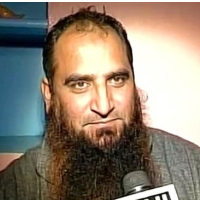Honeymoon Over for J&K Coalition Govt
 Separatist leader Masarat Alam (file photo: ANI)
Separatist leader Masarat Alam (file photo: ANI)
The new state government in Jammy and Kashmir is barely a week old and already the coalition partners have found that living with each other may be troublesome. With Chief Minister Mufti Mohammad Sayeed playing to his political constituency in the Kashmir valley, he has already sparked off needless controversies and miffed off his coalition partner, the BJP.
The first spat was over Sayeed’s controversial statement within hours of taking over, thanking Pakistan, the separatist Hurriyat Conference and militants for the smooth conduct of the assembly election – a strange conclusion for him to reach since none of the three have ever supported the democratic process in the state.
Then eight legislators from Sayeed’s party, the PDP, declared that the 2013 hanging of convict Afzal Guru for the 2001 attack on Parliament was a travesty of justice and demanded the return of his body.
That controversy had hardly simmered down before Sayeed decided to release separatist leader Masarat Alam from jail. The hardline Hurriyat Conference leader was the brain behind the 2010 stone pelting incidents that led to the deaths of 112 people. In jail for over 4 years, he was freed on Saturday evening after the chief minister ordered the state police chief to release all ‘political prisoners’ against whom there were no criminal charges.
The BJP immediately slammed this "unilateral" decision. It said the party was not consulted before Alam was released, and that this was not a part of the Common Minimum Programme (CMP) that the coalition had agreed on.
"We are not going to tolerate any such statement or any such decision which is not as per the Common Minimum Programme that we had agreed upon. We have decided to convey our displeasure to our partner so that such things do not happen in future," state BJP chief and MP Jugal Kishore Sharma told reporters.
In response, PDP spokesman and education minister Naeem Akhtar claimed the decision was in line with the CMP that talked about engaging all stakeholders for establishing peace in J&K.
"If you want to have a dialogue with all stakeholders, which includes these leaders, you cannot engage them by keeping them in jail without anything substantial against them," Akhtar said.
According to the Hindustan Times, the problem for Sayeed is that just who can be called 'political prisoners' is not something that the PDP and BJP can agree on.
Alam had become a prominent figure in the valley for issuing protest calendars during the 2010 unrest. He was arrested on the outskirts of Srinagar city after a four-month search and a bounty of Rs 10 lakh ($16,000).
Angry over his release, over 200 Bharatiya Janata Yuva Morcha workers held a demonstration in Jammu demanding the re-arrest of Alam. State general secretary Ajay Pargal Pargal said that the separatist’s release would again lead to a law and order problem in the state, while BJP MLA Ravinder Raina described it as a “threat to national security”.
It’s clear that Sayeed is walking a fine line between appeasing the Hurriyat leaders and Valley voters, and keeping the BJP from pulling the plug. The canny politician knows that there is no immediate threat to his government as the BJP cannot let the state government fall so soon after it took office, after two months of tortuous negotiations.
Sayeed has obviously decided to take the controversial security decisions now, before voter antipathy against his government grows. But in the process he risks losing the trust of his own coalition partner. The honeymoon between the PDP and BJP is clearly over. Whether theirs will still be a 5-year marriage is the question that people will now ask.
- Karan Singh
To Learn More:
After Mufti Sayeed nudge, Hurriyat hardliner Masarat Alam, who organised 2010 unrest freed from jail (by Arun Sharma and Bashaarat Masood, Indian Express)
BJP miffed by PDP’s decision to release Masarat Alam, tells CM Mufti to refrain from such decisions (by Arun Sharma, Indian Express)
Strains emerge in PDP-BJP govt over release of top J-K separatist Masarat Alam (Hindustan Times)
- Top Stories
- Controversies
- Where is the Money Going?
- India and the World
- Appointments and Resignations
- Unusual News
- Latest News
- India College Chain’s Expansion into U.S. Draws Opposition from Massachusetts Officials over Quality of Education
- Milk Shortages in India Tied to Release of New Movies Featuring Nation’s Favorite Stars
- Confusion Swirls around Kashmir Newspaper Ban in Wake of Violent Street Protests
- Polio-Free for 5 Years, India Launches Vaccine Drive after Polio Strain Discovery
- New Aviation Policy Could Increase Service, Lower Ticket Prices






Comments